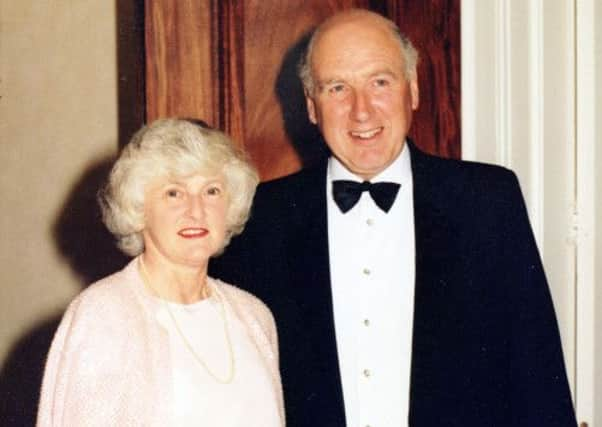Neil Pullan


The firm was founded in 1885 by his great-grandfather Joseph to construct ancillary works for the rapidly expanding railways and was located at Manor Works, Beeston, Leeds.
In the early years many public and private buildings were constructed including the iconic Alhambra Theatre, Barnsley, much of Beeston, and more than 100 houses adjacent to the Duchy Estate in Harrogate.
Advertisement
Hide AdAdvertisement
Hide AdPrior to Joseph’s death in 1924 the firm had become directed by two sons: Alfred, the younger, took the leading part, possibly owing to Ernest, Neil’s grandfather, spending the First World War in France, where he commanded a field company, Royal Engineers.
On his return, Ernest reserved his greater passion for Leeds City AFC, soon to be reconstituted as Leeds United, where he became chairman for many years. He was also a supporter of Yorkshire County Cricket Club and played golf at Moortown and Ganton, enthusiasms adopted by Neil, his grandson.
As a schoolboy during the Second World War, Neil Pullan – who has died at the age of 82 – recalled frequently travelling with his grandfather from Elland Road on the team coach, pausing at bus or railway stations to collect players to complete the team, assuming they had managed to get a pass-out from their camps.
He joined J Pullan & Sons in 1947. Following family custom, he became an indentured apprentice, working on site and attending evening classes at technical school.
Advertisement
Hide AdAdvertisement
Hide AdHis horizons were broadened with National Service. Following officer training he was posted to the 1st Battalion West Yorkshire Regiment, based in Egypt at a time of political turbulence. He soon learned leadership skills and to shoulder responsibility. Shortly thereafter the Battalion was posted to the Far East. He returned home with experience in Egypt, Malaya, Korea and Japan, competent in Cantonese and fluent in the Malay language.
Probably owing to his proximate background of active service he was forthwith visited by the Brigadier and invited to join 12 Battalion The Parachute Regiment, T.A., based at Thornbury Barracks, Bradford, where he served for seven years, only resigning reluctantly due to the demands of the business.
The construction industry was very competitive, margins were slim and, in the manner of third generation directors in a craft industry, the focus was on technical excellence rather than the bottom line. A change of direction was necessary and in 1963 Neil was appointed by the family to enhance the capital base.
Sensing an opportunity for infill development between the then Borough of Morley and the line of the proposed M62 motorway, Mr Pullan borrowed funds to purchase in stages Howley Park Estate.
Advertisement
Hide AdAdvertisement
Hide AdWith the improving transport links and a skilled local workforce, the estate became popular with national companies seeking distribution depots and local employers requiring modern manufacturing premises.
The support of Morley Borough Council, which at the time was autonomous and largely independent of party politics, was instrumental in encouraging new investment to replace the declining heavy woollen industry.
One of the early tenants being attracted to Howley Park was Associated Dairies, trading as Asda, who for the best part of a decade from the mid-1960s was regularly the country’s fastest-growing public company. Their head office remained at Howley Park until relocating to Leeds in the early 1990s.
Mr Pullan had negotiated sites and planning consents on Asda’s behalf for a number of what he called “retail warehouses”, predating the widespread use of the word “supermarkets”. Invited to become a director of Asda, he declined, citing his responsibilities to the family firm.
Advertisement
Hide AdAdvertisement
Hide AdThe revolution of shopping which the advent of supermarkets represented, did not always go smoothly. The large store at Pudsey was set out with a car park to standard industry gradients, taking no account of the use of heavily-laden trolleys. In those days cars were opened with a key, but in the interim the trolley had gained momentum on the slope. The car park was re-laid, and the lesson learnt.
The firm further developed estates at Dudley Hill, Bradford, and Lofthouse Gate, Wakefield: a change of focus, with which the company prospered.
In 1981 Sir John Barron’s clothing factory at Westgate, Leeds, was purchased and converted to Josephs Well and 2 Park Lane.
In 1994 Mr Pullan bought Pawson Brothers quarry, Morley.
By 2003, having accepted that a future generation was unlikely to take to contracting, the firm focused on its development and property business.
Advertisement
Hide AdAdvertisement
Hide AdFor more than 60 seasons, Mr Pullan maintained his grandfather’s interest in the prospects of Leeds United.
He followed Yorkshire cricket in the company of his great friend, Bob Appleyard, and he was an enthusiastic golfer, being a longstanding member of Alwoodley, Ganton, Moortown, and the Royal and Ancient Golf Club of St Andrews. He was founder chairman of Bramhope Round Table, senior Alderman and former Mayor of Chapeltown Corporation.
In 1995 he was appointed High Sheriff of West Yorkshire during which time his most memorable event was being involved in securing the location of The Royal Armouries Museum in Leeds and attending on the Queen when she conducted the opening ceremony.
In 1957 he married Patricia Wilkinson – universally known as Paddy – whose father was an influential figure in the development of the Leeds International Piano Competition and Opera North.
Paddy died last August after a long illness. Mr Pullan is survived by their sons, Mark, responsible for the family group of companies, and Ross. There are four grandchildren.